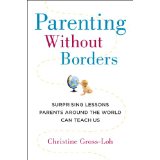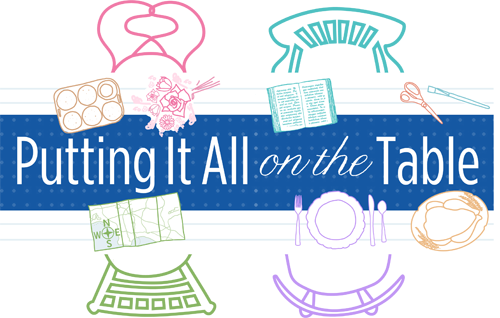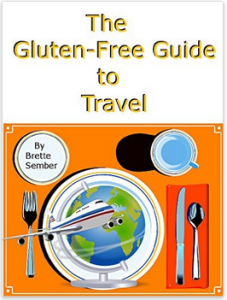Parenting Without Borders
Posted by in Books I tend to be a big unconventional when it comes to parenting. Both of them have told us how shocked their friends are that we don’t have time outs, curfews, phones that are taken away, or a lot of disagreements with them. When my kids were babies, I parented by instinct a lot. Even though everyone said not to, our babies shared our bed, my husband kangarooed our son in the hospital (that got a lot of looks), I breastfed on demand, talked to them as if they understood me, and did crazy things like taking my newly 1 year old outside to stomp in mud puddles. I’m not big on following what you’re supposed to do in most instances.
I tend to be a big unconventional when it comes to parenting. Both of them have told us how shocked their friends are that we don’t have time outs, curfews, phones that are taken away, or a lot of disagreements with them. When my kids were babies, I parented by instinct a lot. Even though everyone said not to, our babies shared our bed, my husband kangarooed our son in the hospital (that got a lot of looks), I breastfed on demand, talked to them as if they understood me, and did crazy things like taking my newly 1 year old outside to stomp in mud puddles. I’m not big on following what you’re supposed to do in most instances.
I was interested to read Christine Gross-Loh’s new book, Parenting Without Borders: Surprising Lessons Parents Around the World Can Teach Us, because I do think there is a lot we can learn from other cultures when it comes to parenting. We as Americans are a bit stubborn when it comes to parenting – certain that our way is the best and that other methods are weird. There’s been a lot of talk in recent years about Asian parenting styles, fueled by The Tiger Mom. I was ready to read what other parenting styles really are like.
Gross-Loh’s approach is one I really liked. This is not a book that tells you everything you’re doing wrong. In fact, she points out the benefits of American parenting styles throughout the book. What she does offer however, are lessons she learned from other cultures that could be helpful to American parents. I was fascinated to learn that in Japan, preschoolers spend most of their time in unstructured play, outside, with other children. The teachers hardly intervene at all, believing that children need to learn to work out their own problems. Many other cultures spend a lot of school hours teaching children living skills – cooking, homemaking, etc. yet they score higher on standardized testing than Americans. Scandinavians spend much less time in school total than our kids and do better than we do.
There are kindergartens in Germany in the woods – literally open air in the woods – where the children spend most of the day doing outdoor activities. There is a tremendous emphasis on children being outside and playing in so many other cultures.
Gross-Loh lived in Japan and raised her children there for several years, so she has great insight into Japanese parenting. She not only shares the way parents in other countries do things, but she analyzes why they do things that way. In Japan they emphasize getting along with others and being part of a group, while here we are all about fostering individuality. I was fascinated to consider the cultural reasoning behind parenting techniques.
She points out in Japan parents are very involved with their babies (they are carried often and sleep in a family bed exclusively) and slowly step away as the kids get older (first graders are expected to walk to school alone). In the U.S., family co-sleeping is considered wrong by most parents (and doctors) and babies are supposed to learn to sleep alone, yet as our kids get older we micromanage and helicopter parent them – almost the exact opposite of what happens in Japan. And honestly when you think about it that way, it makes a lot of sense to do things the Japanese way.
While I really loved this book, most of her real experience is in Japan, although she visited Korea, China, Finland and talked to parents from other countries as well, and did a lot of research into parenting in other countries, presenting the result of many studies. However, there is little or no information about South America or Africa, where I imagine parenting styles are quite different from ours. That would have been an interesting addition to the book.
There’s a lot of information in this book that will make you think about why you parent the way you do and how some small changes might benefit you and your child. You will really feel comfortable with Gross-Loh’s tone, which I found to be very supportive, gentle, and friendly. She is quick to point out the benefits of all the parenting styles she discusses, while never making you feel that any choice you make is wrong. She merely presents other ways of doing things, never labeling any approach as better than any other. Instead, she lets you make up your own mind about what works. Finally, a parenting book that doesn’t make you feel guilty! Gross-Loh also tells you how she has tried to incorporate some of the parenting styles into her own family and how successful that has been.
I definitely would give this book as a baby shower gift and as a gift to new moms for sure. And if you have young kids, this is a book you must read. If you have trouble putting your baby to sleep in his crib (or getting him to actually sleep in it!) you HAVE to read this because it makes it clear co-sleeping is not dangerous, and in fact, the studies in the book show it actually is safer (contrary to what the medical establishment tells us). There’s also lots of great ideas about kids and food, and how children in other cultures learn to eat healthy food, in the right amounts, and listen to their bodies. That is something Americans definitely need help with.
I highly recommend the book and know it will enlighten any parents who reads it.
P.S. If you want to get a taste of the book, read the author’s HuffPo piece here.
You can follow any comment to this entry through the RSS 2.0 Both comments and pings are currently closed.








I had to laugh when I read that some parents in Germany and other places believe in a lot of outdoor activities. I think that was widely accepted throughout the world, even in the U.S. until “Stranger Danger” became the norm in many neighborhoods. I can remember playing outside until literally our moms stepped out on the stoop and called us home or until the street lamps came on. I think our country has lost a lot by not allowing our children the freedom to explore their neighborhoods, to make decisions with our friends, to learn to do thing separate from our parents. We’re a nation of couch potato children who know nothing but video games and computers. Anyway, this does sound like a good book.